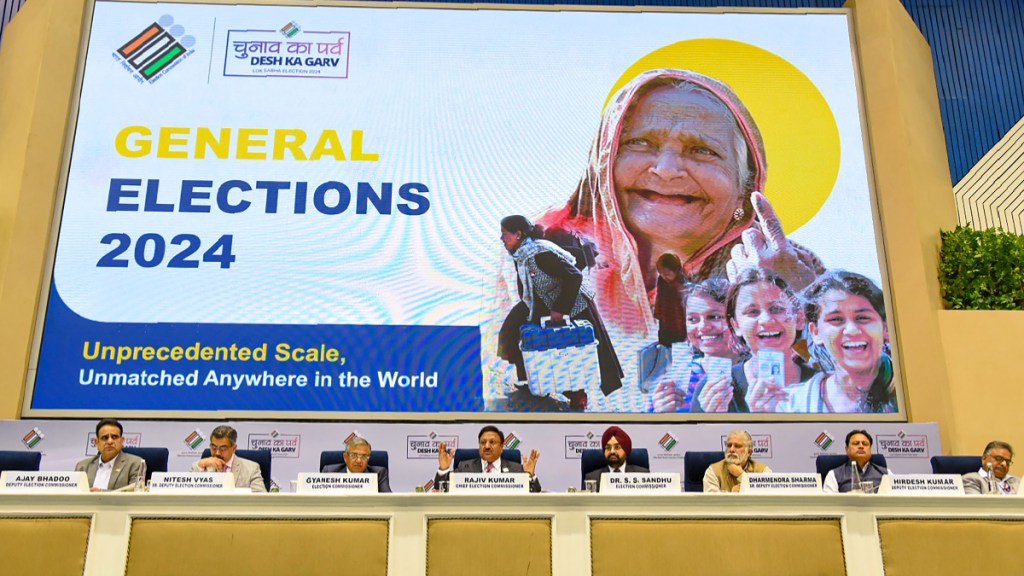The Election Commission of India announced the full schedule of the Lok Sabha elections 2024 on Saturday at a press conference addressed by Chief Election Commissioner Rajiv Kumar. The Commission also announced the election schedule for four state assembly elections.
The Lok Sabha Elections 2024 will be held in seven phases from April 19 to June 1, with counting set to take place on June 4.
Lok Sabha Elections 2024 dates, schedule: Five big takeaways
Magnitude of election
India is set to celebrate the festival of democracy with 97 crore voters, 1.5 crore polling officials and 10.5 lakh polling stations. An immense demonstration of democracy, this is the world’s largest electoral endeavor involving vast manpower and resources. More than 5.5 million EVMs are set to be deployed for the General Elections of 2024.
Inclusivity
The general elections of 2024 mark a significant milestone in India’s democratic journey, characterised by a notable expansion in the voter base, particularly among women, youth, and Persons with Disabilities (PwDs). This growth is a testament to the Election Commission of India’s efforts to ensure inclusive electoral rolls. With approximately 82 lakh registered PwDs, 2.2 lakh centenarian voters, and 48,000 third gender voters, our electoral rolls vividly portray a diverse mosaic of the electorate. This inclusivity not only enriches the democratic process but also underscores the importance of representation and participation for all segments of society, CEC Kumar said.
Technology and Lok Sabha polls
Harnessing the power of technology, the Election Commission of India (ECI) has introduced 27 apps and portals catering to all stakeholders involved in the electoral process.
Among these, cVigil stands out as a tool that empowers citizens to report Model Code of Conduct (MCC) violations swiftly, ensuring assured action within 100 metres. The KYC app facilitates informed voting, enabling voters to make educated choices. Furthermore, a revamped results portal has been launched to enhance the experience on results day, providing stakeholders with comprehensive and accessible information. These technological advancements underscore the ECI’s commitment to leveraging innovation for a more transparent, efficient, and participatory electoral process.
Tackling the challenge of the 4 M’s
According to the EC, conducting free and fair elections entails overcoming four formidable challenges, encapsulated by the 4Ms: muscle, money, misinformation, and Model Code of Conduct (MCC) violations.
Muscle: Strict instructions to DMs and SPs ensure fairness. CAPF deployment is supported by district control rooms. Checkposts and drones enhance vigilance. Zero tolerance for violence, swift penalties for impersonation, and transparent permissions via the SUVIDHA portal maintain trust.
Money: During the 2022-23 election cycle, cash seizures soared to over Rs 3,400 crore across 11 states, marking an 800% increase from five years ago. Enforcement agencies are instructed to target illicit money, liquor, drugs, and other incentives, staying vigilant against disruptive tactics. Extensive reviews with enforcement agencies have led to heightened coordination and a significant increase in seizures, facilitated by tools like the ESMs portal.
Misinformation: ECI stresses “Verify Before You Amplify,” urging reliance on credible sources to combat misinformation and promote accurate information. Vigilance is crucial to maintain electoral integrity, with proactive efforts to debunk false narratives. Misinformation originators face severe consequences under existing laws, as emphasized by CEC Kumar.
MCC Violations: The Election Commission is ready to tackle declining discourse in election campaigns. Parties are urged to avoid personal attacks and offensive language, with clear boundaries established to preserve civility. Upholding the sanctity of the electoral process requires avoiding excessive rivalry and maintaining decorum.
Observers deployed
The Election Commission is taking robust measures ahead of the Lok Sabha elections in 2024, deploying over 2100 General, Police, and Expenditure Observers across various constituencies. These observers serve as the eyes and ears of the Commission, tasked with overseeing the conduct of elections.
Their primary aim is to ensure that the electoral process remains free from any inducement or intimidation tactics, thus maintaining a level playing field for all candidates. By closely monitoring activities on the ground, these observers play a crucial role in upholding the integrity and fairness of the democratic process during this pivotal time in India’s political landscape.


